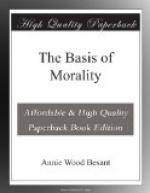Church seclusion is the mark of the religious life,
and “the religious” are the monk and the
nun, the “religious” and the “secular”
being in opposition. In truth, where the realisation
of God outside himself is sought by the devotee, seclusion
is a necessity for success, if only for the time which
is required for meditation, the essential preliminary
of ecstacy. In the very rare Mystics of non-Catholic
communions, full ecstacy is scarcely, if at all, known
or even recognised; an overpowering sense of the divine
Presence is experienced, but it is a Presence outside
the worshipper; it is accompanied with a deliberate
surrender of the will to God, and a feeling on the
part of the man that he becomes an instrument of the
divine Will; this he carries with him into outer life,
and, undirected by love and the illuminated reason,
it often lands the half-developed Mystic into fanaticism
and cruelty; no one who has read Oliver Cromwell’s
letters can deny that he was a Mystic, half-developed,
and it is on him that Lord Rosebery founded his dictum
of the formidable nature of the “practical Mystic”;
the ever present sense of a divine Power behind himself
gives such a man a power that ordinary men cannot
successfully oppose; but this sense affords no moral
basis, as, witness the massacre of Drogheda.
Such a Mystic, belonging to a particular religion,
as he always does, takes the revelation of his religion
as his moral code, and Cromwell felt himself as the
avenging sword of his God, as did the Hebrews fighting
with the Amalekites. No man who accepts a revelation
as his guide can be regarded as more than partially
a Mystic. He has the Mystic temperament only,
and that undoubtedly gives him a strength far beyond
the strength of those who have it not.
The true Mystic, realising God, has no need of any
Scriptures, for he has touched the source whence all
Scriptures flow. An “enlightened”
Br[=a]hma[n.]a, says Shr[=i] K[r.][s.]h[n.]a, has no
more need of the Ve[d.]as, than a man needs a tank
in a place which is overflowing with water. The
value of cisterns, of reservoirs, is past, when a man
is seated beside an ever-flowing spring. As Dean
Inge has pointed out, Mysticism is the most scientific
form of religion, for it bases itself, as does all
science, on experience and experiment—experiment
being only a specialised form of experience, devised
either to discover or to verify.
We have seen the Mystic who realises God outside himself
and seeks Union with Him. There remains the most
interesting, the most effective form of Mysticism,
the realisation by a man of God within himself.
Here meditation is also a necessity, and the man who
is born with a high capacity for concentration is
merely a man who has practised it in previous lives.
A life or lives of study and seclusion often precede
a life of tremendous and sustained activity in the
physical world. The realisation is preceded by
control of the body, control of the emotions and control




